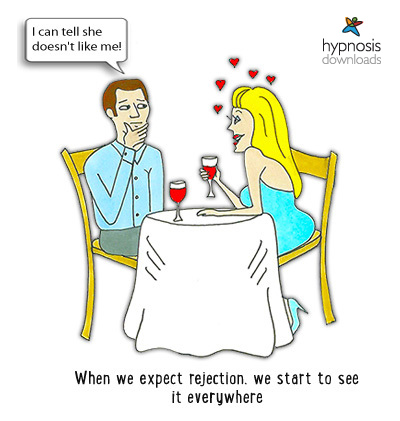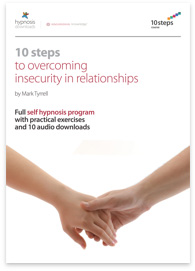7 Tips to Overcome the Fear of Rejection
What would life be like if you didn't care whether everybody liked you or not? Stop fear of rejection limiting your options.
 "In tribal times, being ejected from the safety of a group could mean death."
"In tribal times, being ejected from the safety of a group could mean death."What does all fear really amount to? Loss.
We fear:
- losing our health
- losing our life
- losing our status
- losing money
- losing our peace of mind
- losing our youth and looks.
We also fear, perhaps more than anything else, losing approval from others. Fear of rejection is widespread. In tribal times, being ejected from the safety of a group could have meant death. No wonder many of us like to 'fit in'.
Fear should keep us alert and safe - like the beam from a lighthouse warning ships of submerged dangers. But too much fear, like a super-beam of light blinding the ship's captain, can cause the loss of the very thing we feared losing.
Prefer to watch instead?
And this may be especially true when it comes to fear of rejection. Take Kelly; her fear was taking over her life and damaging her relationships.
"I was always the new kid, trying desperately to be accepted, to fit in! I went to eight different schools in five years, rejection upon rejection. I can so clearly remember playing on my own, always the new girl, always craving acceptance!"
Kelly was convinced that these early "outsider" experiences were at the root of her current problems: "I'm always looking for signs that my partner is about to reject me! It drives him mad. I'm always seeking reassurance, always wondering what he really means."
Where do you find your reassurance?
Seeking reassurance from other people is a dead end. Reassurance needs to be found from within you, not from others. Why? Because any look, word, or action from other people can be warped and wrongly interpreted as an upcoming rejection when it simply isn't.
Kelly's terror of rejection also extended beyond her relationship. She was a budding author and had completed six novels, but fear of knockback had, until now, prevented her from ever submitting any of her work.
The tips here were created to help you feel more self-assured; which in turn, of course, will lead you to be less needy and more confident that things can work out for the best or...if they don't, that it's:
- Not necessarily your fault.
- Something you'll handle successfully and from which you'll move on.
So how can you deal with fear of rejection?
1) There's nothing to fear but fear itself
Ever hear the term 'self-fulfilling prophecy'?
A self-fulfilling prophecy is a false idea about a situation that makes the person with the belief act in such a way that the false idea comes true. You wrongly believe your partner is rejecting you; you become defensive, anxious, perhaps angry. Eventually, these behaviours may bring about the feared rejection which wasn't there to begin with.
Someone wrongly believes a group will reject them, so they start feeling angry with the group, and the group rejects them. Now the 'prophet' feels they were right from the very beginning: "I told you so!/I knew it!"
You see how this works? In fact, some people just want to be proved right - even if that means a bad outcome! Expecting the worst can act as a type of emotional insurance policy.
Look to yourself. How do your beliefs around possible rejection influence your behaviour? And how does that behaviour influence your actions? You can't start to change your actions until you really see what is going on. Start looking for signs of what is working rather than just signs of what's going wrong.
2) Have you thought about how you want to feel?
Ever noticed how people having emotional problems often seem to tell you how they don't want to feel? Fair enough, but at some point you need to work out how you do want to feel. Imagine someone trying to learn a new language and spending all their time focusing on how they don't want to not study, how they don't want to not speak a word on their upcoming holiday. Okay enough already; what do they want?
Don't focus on how you don't want to be "paranoid" (as Kelly described herself). Focus on how you do want to be. You don't learn to jump rope by constantly telling yourself you don't want to fall on your face. Right here and now, take a few minutes and really think about how you want to be in the future around this issue: relaxed, indifferent, self-assured?
3) Do you have any idea how your fear of rejection began?
I know this might seem like a contradiction to the above, but it can be valuable to look to the beginnings of that old fear of rejection. Kelly was sure it came from her schooldays. Maybe you'd been taught by someone else that rejection is the very worst thing that can happen. Perhaps you can remember specific times when you'd felt very rejected before.
Close your eyes and imagine going back to those times as your current self with all you've learned since that time (even the things you've learned from this fear of rejection article). Imagine reassuring that younger you: your present you calmly telling that younger self how everything's going to be okay. This may sound strange, but it had a powerful impact on the way Kelly felt about those old school times and helped her 'move on' from them.
4) Use your imagination constructively
Trying to think differently is a small part of actually changing. The truth is, our thoughts don't always determine our feelings (how often do we hear this idea!). Actually, emotion has to be quicker than thought, because emotions have to do with our survival. So we're more likely to think differently when we feel differently. (1) (2)
This is why I use hypnosis. Hypnosis can work directly with how people feel when they experience situations and therefore bypass the impracticalities of trying to change someone's thought processes when they are highly emotional. Hypnosis is used to rehearse feeling change so that people can then naturally think differently, without having to force it. For example, once a spider phobic starts to feel relaxed around spiders, they can then naturally think differently around them.
5) Distrust your own opinion (sometimes)
People who never learn to question their assumptions (however emotionally clouded they were when they jumped at them) make life harder. If your perception is always so accurate, maybe you should get around to winning that lottery. Part of my therapy with Kelly was to make her less sure of herself, to start doubting that she 'just knows' what her partner is thinking or what is going to happen.
Being more confident in life partly means being less sure that you know what is going to happen (so you can relax and allow for the possibility of both bad and good outcomes). Relaxing with not knowing is the key to confidence and also to enjoying life.
6) I will survive
"I wrote for twelve years and collected 250 rejection slips before getting any fiction published, so I guess outside reinforcement isn't all that important to me." - Bestselling author Lisa Alther
Fear of rejection - in fact, any fear - thrives on 'end of the world thinking':
- "What if he leaves me?"
- "What if she rejects me?"
- "What if no one wants to speak to me at the party?"
If we feel that rejection will mean the 'end of the world' for us, then we will fear it all the more. It (the fear) has power over us. But if you sit down and think: "Okay, if this relationship does end, how will I manage?", you are facing your fear constructively. Of course you'll survive and you may even thrive. Knowing you'll be okay whatever happens gives you huge amounts of confidence and makes it easier to finally switch off the old automatic rejection detector (which is faulty anyway).
We human types are very bad at accurately predicting how upset we'll be by future misfortune (3). So ask yourself: "Okay, if this future 'disaster' I keep scaring myself with were to happen, what are five constructive ways I could cope and eventually thrive again?" Tell yourself a story (you could even write it down) of how you'll allow yourself to be upset for a while, but then begin to cope very well. Just doing this will allow you to feel less fear around the possibility of rejection.
7) Question what 'rejection' really means
If a man discovers a diamond in the earth but, through ignorance or short-sightedness, believes it to be a worthless stone and so casts it aside, does this tell us more about the diamond or the man? Whether someone rejects someone else can tell us so much more about the 'rejecters' than the rejected. Consider what people have rejected:
- Life-saving medicine.
- Signing a contract with The Beatles.
- Publishing the (eventual) bestselling book Catch-22 (which was rejected by 21 publishers and went on to sell 10 million copies).
- Vincent Van Gogh's paintings.
- Wonderful partners.
If someone does 'reject' you, don't inevitably feel it's because you're 'unlovable' or 'destined to be alone' - because what they've done is give you very clear feedback about... themselves.
Kelly grew beyond her old fear of rejection and is now happy to enjoy her present and let the future "do whatever it likes".
10 Steps to Overcome Insecurity in Relationships course
Despite how much you love your partner, are you worried you're driving them away?...
References
- LeDoux, J.E. (1993) Emotional memory systems in the brain. Behavioural Brain Research, 58.
- This isn't to say that thinking about things differently won't help us feel different, as of course it can do. But if emotions are very strong, we need to deal with the emotions before the brain is composed enough to absorb new ways of seeing.
- Daniel Gilbert, author of Stumbling on Happiness, describes research that shows people are very inaccurate in forecasting what will make them unhappy in the future (as well as happy). "We certainly fear the things that would get us down to 20 or 10 - the death of a loved one, the end of a relationship, a serious challenge to our health. But when those things happen, most of us will return to our emotional baselines more quickly than we'd predict. Humans are wildly resilient."







